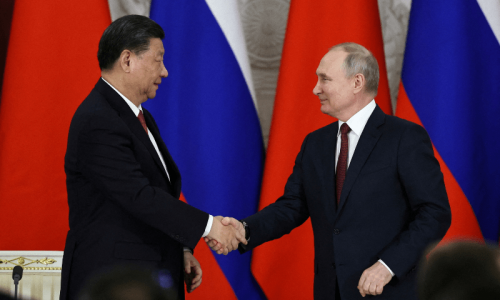RIYADH, May 6: US-allied Gulf Arab leaders called on Iran on Saturday to do more to show it was not trying to obtain an atom bomb, thereby saving the region from another war.
Gulf Arab countries, wary of Iranian power since the 1979 revolution, share US concern at the prospect of Tehran having a nuclear bomb but fear another military conflict in the region after the 2003 US-led invasion of Iraq.
Gulf Arabs are also worried about the possible environmental effects of a US attack on Iran’s nuclear plant at Bushehr on the opposite side of the Gulf, or of leakage from unmonitored Iranian sites.
“We appreciate Iran’s efforts to reassure the region over its programme,” United Arab Emirates Foreign Minister Sheikh Abdullah bin Zayed al Nahayan told reporters after a summit of the Gulf Cooperation Council (GCC).
“But for the sake of stability and to avoid any environmental disaster, there needs to be more Iranian guarantees and we are trying to ensure this.”
The minister declined to say whether the political and economic alliance, comprising Saudi Arabia, Kuwait, Bahrain, Oman, Qatar and the UAE, might try to use its close links to Washington to mediate in the dispute.
He said Iran had ‘commitments to its Arab neighbours as well as the international community to ease concern over its nuclear plans.
“We hope this crisis will be brought to an end through peaceful dialogue and (Iran) cooperating with the International Atomic Energy Agency (IAEA),” GCC Secretary-General Abdul-Rahman al-Attiya said after the Riyadh talks, attended by leaders of major oil-exporting nations.
The one-day summit took place as France and Britain, with US backing, drafted a U.N. resolution demanding a halt to Iran’s nuclear fuel programme.
Russia and China, which have vetoes on Security Council resolutions, may oppose sanctions against Iran, the world’s fourth biggest oil exporter. The GCC states have not said what their position on sanctions would be.
Popular concern over a nuclear Iran in the Arab world is mainly limited to the Gulf region. Iran’s pro-Palestinian rhetoric plays well to Arab street, which views its governments as doing little to stand up to US backing for Israel.
Arab countries bordering Israel are at least as concerned about the Jewish state’s suspected nuclear arsenal.
“These (Gulf Arab) countries do not want Iran to have a nuclear weapon but they also do not want it taken by force,” said Saudi political analyst Dawoud al-Shiryan.
Gulf countries, particularly Saudi Arabia, fear pressure on them to follow in Iran’s footsteps if it obtains the bomb — challenging the quietist ethos of Gulf states and their alliance with Washington. —Reuters











































Dear visitor, the comments section is undergoing an overhaul and will return soon.